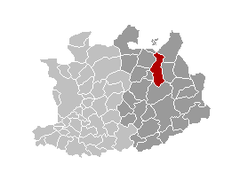Turnhout
| Turnhout | |
|---|---|
| Region: | Flanders |
| Province: | Antwerp |
| District: | Turnhout |
| Area: | 56.06 km² |
| Population: | 39,791 (2006) |
| Population density: | 710 /km² |


Turnhout is a Belgian municipality located in the Flemish province of Antwerp. The municipality comprises only the city of Turnhout proper. On January 1 2006 Turnhout had a total population of 39,791. The total area is 56.06 km² which gives a population density of 710 inhabitants per km². Turnhout, is famous as the world center of the playing card and is both legally and administratively the capital of the Kempen region and of the local district. It is also the economic and cultural center of its region wih more than 40 schools. There is also an important services sector with 2 hospitals, a 2 stage theatre and an 8 screen cinema.
Turnhout is located at about 51.3 North and 4.9 East, 42 km from the centre of Antwerp, 30 km from Breda and Tilburg, 40 km from Eindhoven. The football club of the city is K.V. Turnhout.
History
Turnhout originated on the crossroads of two major trade routes and in the protection of the hunting castle of the Dukes of Brabant that seems to have existed since 1110 or earlier. This hunting past is still reflected in the city's coat of arms. The small community that developed obtained its Libertas as a “free city” from Henry I, Duke of Brabant in about 1212. In 1338, the privilege of organizing a market on saturday was granted, a tradition that still holds today. In 1466 a traveller described the well-built houses and paved roads, and counted five churches.
By the 16th century Turnhout had become a wealthy commercial center. Unfortunately there were not only ups, but also downs. The end of the 16th century brought war, fire, confiscations and epidemics. Suppresion and inquisition made many progressive citizens to take refuge in Holland, leaving the land of Turnhout impoverished behind. The further history of Turnhout consists of a series of ups and downs. Many times, the city and surroundings were the playground of armies, resulting in two major battles named after Turnhout: one in 1597 and one in 1789 are referred to as Battle of Turnhout.
In 1830 Belgium became independent, and Turnhout fell just south of the new border with the Netherlands. The period of peace between 1831 and 1914 saw the digging of the canal (1846) and the construction of the railroad (1855).
In the late Middle Ages Turnhout was a well-known centre for the weaving of bedding articles and of the linen trade. At the start of the 19th century these trades were replaced by industries based on the use of paper. Pieter Corbeels and Philippus Jacobus Brepols are considered to be the founder of this industry. Turnhout retains much of this industry today. Numerous graphics companies are located in the region, such as Brepols, Group Joos, Proost International Book Production, Van Genechten Packaging, and last but not least Cartamundi, the world market leader of the playing card industry. In addition the Belgian Centre for the Graphics Industry, and the Flemish Innovation Center for Graphic Communication are located in Turnhout.
Sights

Architectural sights worth visiting are the 12th century castle of the Dukes of Brabant, the gothic church of St. Peter, the beguinage (begijnhof) dating from the 13th century, the 14th century gothic chapel of Theobald and the Taxandria museum housed in a prestigious renaissance mansion. Of particular interest is the Museum of the Playing Card. This is located in an old factory building downtown and houses a beautifully restored steam engine.
The beguinage was recognized by UNESCO as a World Heritage Site in 1998.
Events
Turnhout is host to the biannual comic festival Strip Turnhout, the oldest comic festival of Flanders, and one of the largest. Every year, there is also the film festival Open Doek. During the summer months, the "Vrij-dagen" are organised. For a certain period, every friday two artists or bands give a live performance. The event is completely free and attracts large crowds, strongly benefitting the local economy.
Famous inhabitants
- Philippus Jacobus Brepols, founder of Brepols.
- Filip Daems, footballer (b. 1978)
- Pieter Corbeels, printer and a leader of the Boerenkrijg
- François du Four, printer and mayor.
- Paul Geerts, comics artist, successor of Willy Vandersteen as artist and author for the Spike and Suzy comics (b. 1937)
- Constant Janssen, father of Paul Janssen and founder of the N.V. Produten Richter.
- Paul Janssen, pharmacologist, founder of Janssen Pharmaceutica (1926-2003)
- Micha Marah, singer, Eurovision representant in 1979 (b. 1953)
- Aloïs Michielsen, born in Turnhout, chairman of the board and former CEO of Solvay
- Lieve Slegers, long-distance runner (b. 1965)
- Jan Renier Snieders, physician and writer (1812-1888)
- Paul Stoffels, co-founder of Tibotec and Virco.
- Cornelis Verdonck, composer of the late Renaissance (1563-1625)
See also
Twin cities
External links
- Official website - Available only in Dutch
- Strip Turnhout - English version under construction
- Open Doek - In Dutch only


